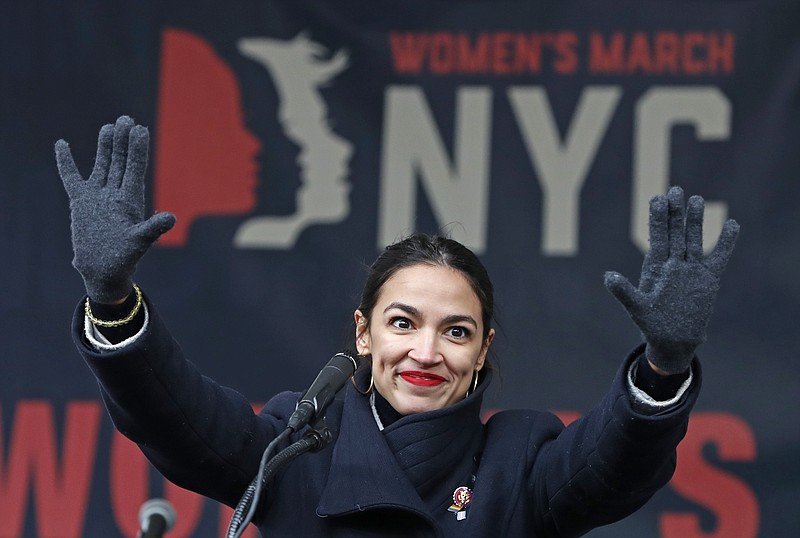What do Americans already like about democratic socialism?
This is not a trick question.
Webster's dictionary defines socialism as a form of society in which government owns or controls major industries. Marxist theory says socialism is the transitional stage between capitalism and communism.
Democratic socialism advocates political democracy alongside social ownership of the means of production - with an emphasis on self-management and democratic management.
Let's see. Medicare probably qualifies, as does our national park system. Also, under our laws, our air and water are "owned" by the state - meaning the people. And Congress, by the way, works for us.
Sen. Bernie Sanders popularized democratic socialism first, saying the kind of socialism he advocates is the Democratic socialism seen in Scandinavia and other countries in Europe. Those governments support paid sick leave, universal health care and free higher education.
"How many Americans know that in virtually every major industrialized country, people are guaranteed vacation time, paid vacation time? That when you have a baby, moms and dads are guaranteed family leave?" Sanders told NPR in 2015.
The description "democratic socialism" took on a new life this year with the raft of new Democrats winning over the House of Representatives - especially the youngest woman elected to Congress, Alexandria Ocasio-Cortez, the newest poster child of democratic socialism that Republicans love to hate.
Already, President Trump has taken aim at "calls to adopt socialism in our country." Axios last week suggested that Trump would use American fear of socialism as "a lifeline." NPR reported that Trump hopes to make another distinction: "socialism" vs. "greatness."
For this reason alone, more Americans need to understand the differences in socialism and democratic socialism.
Here's a quick quiz, borrowed from a September article in The New York Times:
* In an ideal world, who would control the means of production: private owners, the government or workers? If you said workers, you agree with democratic socialists.
* In a capitalist system, do you believe government regulations are helpful or harmful? If you said helpful, you agree with democratic socialists.
* Do you believe that everyone is entitled to a certain minimum standard of living? If you said yes, you agree with democratic socialists.
* Do you believe labor unions are a positive force? If you said yes, you agree with democratic socialists.
* Do you favor "Medicare for all," or a single-payer government health care system where doctors are public employees? If so, you agree, at least in part, with democratic socialists.
* If you think major social or political change would ideally be achieved through the traditional democratic process of elections, legislation, popular lobbying and grass-roots organizing, you agree with democratic socialists.
Yet for many middle-aged and older Americans, "socialist" sounds a lot like "communist."
That's not true, however, for younger America. According to a 2015 YouGov poll, only 15 percent of Americans over 65 have a positive view of socialism. But for people between the ages of 30 and 64, that positive view rises to 26 percent. For voting age people under 30, it jumps to 36 percent.
According to Forbes, other polls point to why. Last year, many aspects of Ocasio-Cortez's "socialist" economic agenda often found a majority or close-to-majority support. A majority of Americans voiced support for the federal government ensuring health care for all, for free college tuition at public universities, and for the proposition that upper-income people and corporations pay too little in taxes. Even a federal jobs guarantee received 46 percent approval. Polls also continue to show that a majority of voters don't view Republican tax cuts as helping people other than the rich.
"Bottom line: On economic policies, many voters aren't hostile to a lot of democratic socialist ideas, although they surely shun the label "socialist," economist Teresa Ghilarducci wrote in an August Forbes piece. "And Ocasio-Cortez herself is not a purist, but rather someone looking to get these ideas into the national dialogue, perhaps like the Tea Party introduced extreme right-wing ideas such as privatizing Social Security."
As for Ocasio-Cortez herself, she calls Democrats a big tent party. "You know, I'm not trying to impose an ideology on all several hundred members of Congress " She says she is not about "selling an -ism or an ideology," but about "selling our values."
And in an American economy with record-low unemployment - less than 4 percent - what values would those be? They would be values that this so-called "great" economy still isn't relieving: Americans' insecurity in health care, retirement and our own, as well as our children's, future.
Candidates calling for higher pay, reduced inequality and economic security may not be as far left as we think.
Calls for higher minimum wages, stronger labor unions, fair housing and equal pay policies were all part of Harry Truman's policies and his 1948 winning platform, Ghilarducci wrote in Forbes. "Was "give 'em hell, Harry' a Democratic Socialist? No, but he was seeking practical solutions to real problems. President Truman, coming after World War II and facing political unrest and economic uncertainty, was as practical a politician as many on the scene today, seeking solutions for economic inequality and insecurity."
